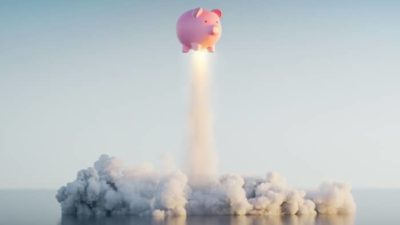This article was originally published on Fool.com. All figures quoted in US dollars unless otherwise stated.
If you've been following the US stock market even casually this year, you know there's one factor above all that's been roiling Wall Street: inflation.
Inflation is near a 40-year high, clocking in at 8.3% year over year in August, and those persistent price increases have led the Federal Reserve to raise interest rates faster than it has in at least a generation. On Sept. 21, the Fed raised the federal funds rate another 75 basis points, its third such hike in a row. That, along with bearish commentary from Fed Chairman Jerome Powell, sent the stock market into free-fall to close out September. In just eight trading sessions from Sept. 20 to Sept. 30, the S&P 500 sank 7%. Higher interest rates tend to be bad for stocks, both because they make future earnings less valuable and make bonds more attractive by comparison.
In October, it shouldn't come as a surprise that any news that could influence the Fed's future rate hike plans is likely to move the stock market. Though it won't deliver its next interest rate decision until early November, there are three events in particular that investors will want to watch this month.
1. The September jobs report (Friday, Oct. 7, 8:30 a.m. ET)
The monthly jobs report from the Bureau of Labor Statistics, officially known as the Employment Situation Summary, is closely watched even in a stable economy. In the current one, it takes on extra importance.
The jobs report may be the best barometer of the overall health of the economy. Despite high inflation and the Fed's aggressive fiscal tightening, the unemployment rate has remained near record-low levels under 4%, and job growth remains strong. In August, the economy added a solid 315,000 jobs, following an even stronger 526,000 new jobs in July.
Normally, investors like to see strong growth in the labor market, but in the current environment, their priorities are a bit different. Since the Fed is likely to keep raising interest rates until inflation cools, any sign the economy is cooling should be received well by investors. It may seem ironic, but since the market narrative is focused on the Fed, a strong jobs report is likely to push stocks lower, while a weak one should give the market a boost.
2. The September Consumer Price Index report (Thursday, Oct. 13, 8:30 a.m. ET)
With inflation dictating the Fed's moves, the monthly CPI report has become the government's most influential data release. Inflation actually cooled off somewhat in July and August, largely due to falling oil prices, but the August inflation reading didn't fall as much as expected. Core inflation, which excludes the more volatile food and energy categories, also remained elevated, up 0.6% from the prior month.
In the wake of that worse-than-expected August report, the S&P 500 plunged 4.3% on Sept. 13, and the September reading could cause a stock swing of similar magnitude. The good news is oil prices continued to fall in September, easing some price pressures. There's also a good chance year-over-year numbers will fall since they're lapping the 0.4% month-over-month and 5.4% year-over-year increases from Sept. 2021. However, this time, Wall Street will be focused on the month-over-month change.
Friday's jobs report could also influence estimates for the CPI.
3. JPMorgan Chase's Q3 earnings report (Friday, Oct. 14, 8:30 a.m. ET)
The big banks will kick off earnings season in mid-October. As financial institutions, they tend to have their fingers on the pulse of the economy, and no quarterly update from the sector is more closely watched than that of JPMorgan Chase (NYSE: JPM).
It's the No. 1 bank in the country by assets and is a leader in a wide range of financial businesses, including credit cards, mortgages, commercial banking, and investment banking. Among the metrics that investors will be paying attention to in the upcoming report are its loan growth, loan loss reserves (or provision for credit losses), and credit card sales volumes.
However, there's another reason investors will be tuning into JPMorgan's earnings call. CEO Jamie Dimon is one of the most respected business leaders in the country, and he isn't afraid to share strong opinions on the economy. On a client call in August, Dimon said there was only a slim chance the U.S. would avoid a recession, and he also suggested there was a 20% to 30% possibility the economy would experience "something worse" than a recession. This next earnings call will give him a chance to elaborate on that forecast, among other topics.
Given his longtime stewardship of the nation's largest bank, Dimon has as good of a sense as anyone of what's happening in the economy. If he forecasts doom and gloom, and if JPMorgan's numbers disappoint, the stock market is likely to take a hit as a result.
This article was originally published on Fool.com. All figures quoted in US dollars unless otherwise stated.









